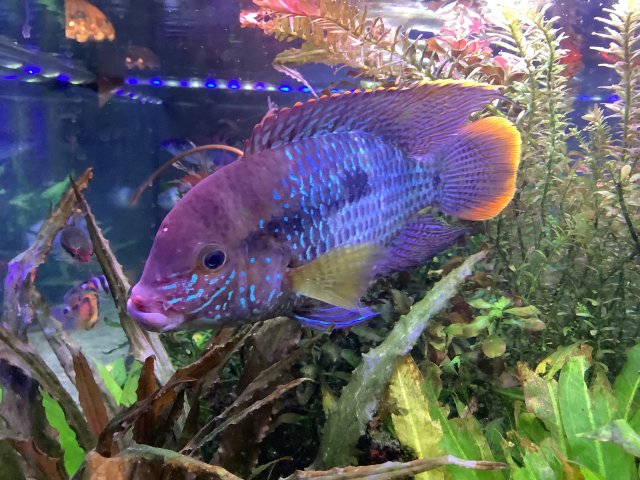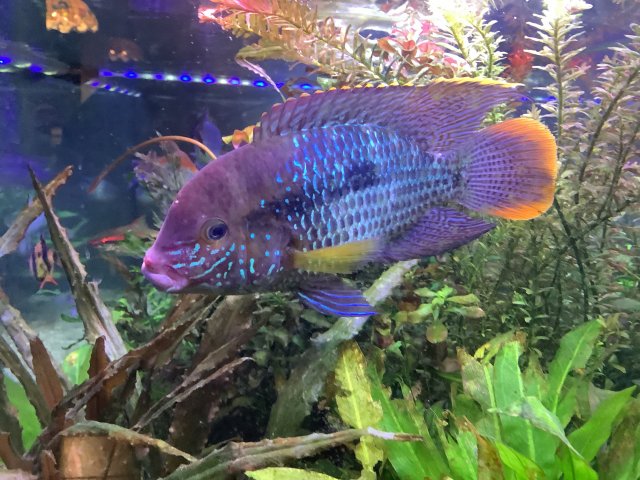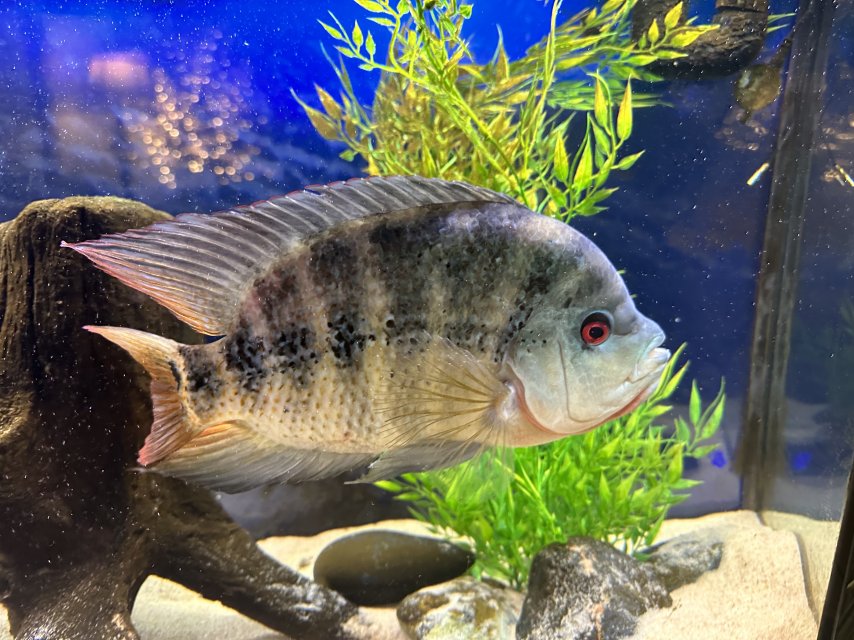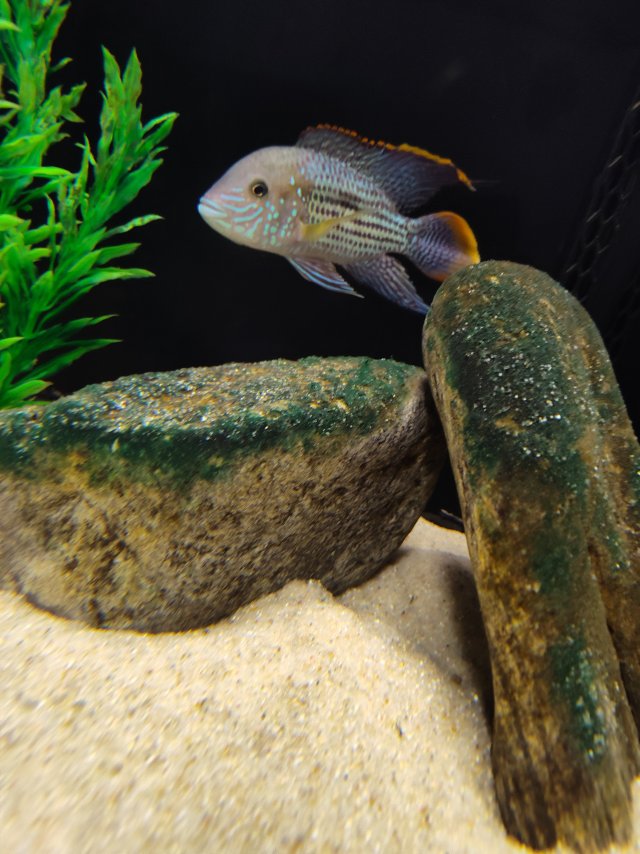Green Terror, 33 days without eating
- Thread starter Galactik
- Start date
You are using an out of date browser. It may not display this or other websites correctly.
You should upgrade or use an alternative browser.
You should upgrade or use an alternative browser.
Does anyone here know more or less how long can a fish like this go without eating?
This is the part that concerns me given that its been over a month now.
I tried reading online but almost everything i found said a couple weeks or longer for bigger fish. However mine is not particularly big (5-6").
This is the part that concerns me given that its been over a month now.
I tried reading online but almost everything i found said a couple weeks or longer for bigger fish. However mine is not particularly big (5-6").
I had a Victorian cichlid that refused to eat for two months, and wasted away to ultimate death. His color remained vibrant, continued to fight territorially, and attempted to eat but spit out the food, for a long while. When a fish abruptly refuses to eat, it could be indication of internal parasitic or bacterial infection. Symptoms may not be visible outside for a long while, or never till death. I have no success treating fasting fish, medicine or live food enticement.
I have a share of GT death from self starvation, but symptoms showed up shortly
I have a share of GT death from self starvation, but symptoms showed up shortly
I raised this GT from juvie for about a year that turned into a gorgeous male. Unfortunately, it suddenly caught a systemic infection with the first sign of, appearance of a small white dot in the forehead, and gradual development of swollen lips. I know he will die in a week as I had lost GT with exact same symptoms previously. At the mean time , he still shows good color, and behaves normally except not eating. I’m not aware of any effective treatment, but, doesn't seem to be contagious, so I let him runs his course and took a few pics for memory.

 ...
...

 ...
...- tiger15
- Replies: 23
- Forum: Freshwater Diseases and Health Issues
Here is my old ass amphilophus lysoni that sulked for almost two months after his lady friend passed. I threw everything from frozen, fresh, and treats into his tank and he wouldn’t touch a thing and really thought he would just pass away. I had a handful of their spawn in the tank that was fed daily using 3mm Northfin pellets with the weekly dose of frozen krill, bloodworms, brine shrimp, and plankton and just like that he ravaged the hell out of just the bloodworms then immediately started to eat daily after. God knows why he didn’t eat but he’s 12 years old this year, looks a little raggedy but is still active and eats daily. Here is after two months of not eating, you can really see the sunken stomach.Does anyone here know more or less how long can a fish like this go without eating?
This is the part that concerns me given that its been over a month now.
I tried reading online but almost everything i found said a couple weeks or longer for bigger fish. However mine is not particularly big (5-6").

I tried soaking frozen bloodworms with pellets and my gt still won't take as I'm going through the same as the op.
Last thing I want to do is to humanely euthanize him but I want to give him more time. If no success in another month, then I will have to. I'd hate see my guy suffer. I've tried frozen food, peas, pellets, bug bites, flake, pellets with garlic guard and pellets soaked with garlic guard with seachem metro for possible internal issues.
So today I decided to force feed some food mixed with some garlic guard and general cure to see if we can get things moving.
I was very nervous doing this but it was a little easier than I thought. Basically laid the fish down and used a small pippette to deliver the mixture directly in his stomach. I made sure not to over do it and that it didn't come out through the gills.
Fish sulked for like 5 minutes after but now is out and about again.
I guess I just have to wait and see now.
I've read about some people having success doing this and I figured might be worth a try at this point that he seems to still have energy.
I noticed he is still pooping a transparent stringy poop, but it has nothing in it since he hasn't eaten in over a month.
I was very nervous doing this but it was a little easier than I thought. Basically laid the fish down and used a small pippette to deliver the mixture directly in his stomach. I made sure not to over do it and that it didn't come out through the gills.
Fish sulked for like 5 minutes after but now is out and about again.
I guess I just have to wait and see now.
I've read about some people having success doing this and I figured might be worth a try at this point that he seems to still have energy.
I noticed he is still pooping a transparent stringy poop, but it has nothing in it since he hasn't eaten in over a month.
UPDATE: *****
I couldn't find any information on this regarding my particular case and how long the fish had been refusing food for, so I wanted to share (anecdotally at least) in case anyone else had a similar issue.
Forcing food with meds seemed to be the turning point for me. But not the end all be all.
After forcing some food with meds, the fish still didn't eat for a few more weeks. However, he was showing signs of being interested, which hadn't happened in a while.
I re introduced live food again since the fish was already wasting away and he started eating immediately. I kept this going for about a week so I could get him recovered enough and then started the process of offering the same live food he wanted but this time, not alive.
THIS is where the real challenge began.
The fish refused to eat again, even though it was literally the same food. It seems that I had a combination of parasites mixed in with the GT only being stimulated by the hunting aspect of eating.
I ended up having to transition the fish from live fish to live worms. Then I graduated him to half dead worms (freshly cut) until he got used to eating them completely dead.
After that, I had to condition him to getting used to having pellets floating around while eating the worms - essentially just getting used to the smell during feeding time ( he completely ignored those for a while). About a month later, I stopped offering worms and would only drop pellets.
It took about 2 more months after this before he started eating pellets again.
Now he's back to normal and eating pellets with gusto!
So long story short, while these guys seem to be prone to parasites, they are also very stubborn and can/will go on for several months (6+) without eating to prove a point. Even if they die in the process.
If you've done everything on the medication side of things, you better buckle up and start a good ol conditioning experiment. It might be the thing that actually makes a difference.
I couldn't find any information on this regarding my particular case and how long the fish had been refusing food for, so I wanted to share (anecdotally at least) in case anyone else had a similar issue.
Forcing food with meds seemed to be the turning point for me. But not the end all be all.
After forcing some food with meds, the fish still didn't eat for a few more weeks. However, he was showing signs of being interested, which hadn't happened in a while.
I re introduced live food again since the fish was already wasting away and he started eating immediately. I kept this going for about a week so I could get him recovered enough and then started the process of offering the same live food he wanted but this time, not alive.
THIS is where the real challenge began.
The fish refused to eat again, even though it was literally the same food. It seems that I had a combination of parasites mixed in with the GT only being stimulated by the hunting aspect of eating.
I ended up having to transition the fish from live fish to live worms. Then I graduated him to half dead worms (freshly cut) until he got used to eating them completely dead.
After that, I had to condition him to getting used to having pellets floating around while eating the worms - essentially just getting used to the smell during feeding time ( he completely ignored those for a while). About a month later, I stopped offering worms and would only drop pellets.
It took about 2 more months after this before he started eating pellets again.
Now he's back to normal and eating pellets with gusto!
So long story short, while these guys seem to be prone to parasites, they are also very stubborn and can/will go on for several months (6+) without eating to prove a point. Even if they die in the process.
If you've done everything on the medication side of things, you better buckle up and start a good ol conditioning experiment. It might be the thing that actually makes a difference.



